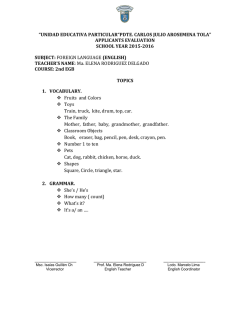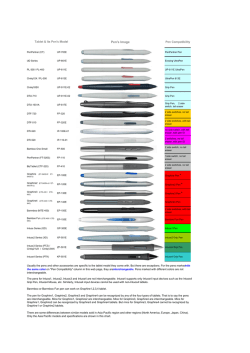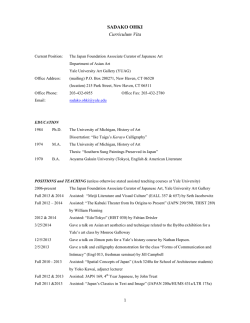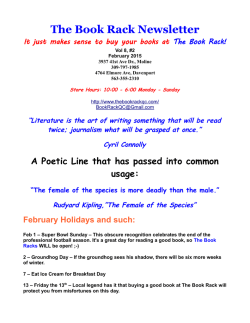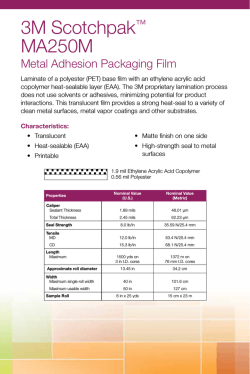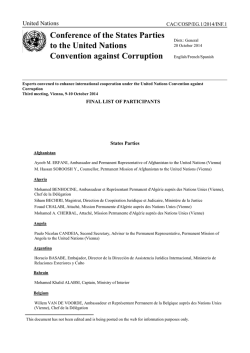
Download the Workshops Bulletin - Washington Calligraphers Guild
2015 WORKSHOPS BULLETIN SHEILA WATERS SHANE PERRY MARGARET MORGAN PAT BLAIR GRETCHEN ELSON JACQUELINE SULLIVAN DAVID MCGRAIL Registration Information and Form PLEASE MARK THE BOX FOR EACH WORKSHOP FOR WHICH YOU WISH TO REGISTER. BEGINNING CALLIGRAPHY: PART 1 & II POINTED PEN SKETCHBOOK WITH PAT BLAIR MARCH 14-15 Vienna Arts Society 9:30 a.m. – 4:30 p.m. $140 members/ $165 nonmembers WITH GRETCHEN ELSON SEPTEMBER 26 & OCTOBER 17 BEGINNING CALLIGRAPHY: PART 1 & II LETTERING AS DRAWING WITH SHANE PERRY APRIL 11 & MAY 16 PART I (Saturday, April 11) PART II (Saturday, May 16) Columbia Art Center 9:30 a.m. – 4:30 p.m. $140 members / $165 nonmembers CREATING WORKS OF BEAUTY WITH DAVID McGRAIL APRIL 24, 25, 26 (Friday, Saturday, Sunday) Vienna Arts Society 9:30 a.m. – 4:30 p.m. $230 members / nonmembers $268 ACRYLICS – LIVELY & LUSCIOUS LAYERS WITH JACQUELINE SULLIVAN MAY 2-3 PART I (Saturday, September 26) PART II (Saturday, October 17) Vienna Arts Society 9:30 a.m. – 4:30 p.m. $140 members / $165 nonmembers WITH MARGARET MORGAN OCTOBER 9, 10, 11, 12 (Friday through Monday) Sheila Waters’ Studio 9:30 a.m. – 4:30 p.m. $280 members / $330 nonmembers VERSALS: FROM ROMAN THROUGH GOTHIC VARIATION WITH SHEILA WATERS NOV 7-8 Sheila Waters’ Studio 9:30 – 4:30 p.m. $140 members / $165 nonmembers Columbia Art Center 9:30 a.m. – 4:30 p.m. $140 / $165 nonmembers Name Address City, State, Zip Phone numbers (home) E-mail address 2 (cell) Are you a WCG member? Yes No Pat Blair PAT BLAIR Pointed Pen Sketchbook March 14-15 Vienna Arts Society 9:30 a.m. – 4:30 p.m. T he pointed, flexible nib is a marvelous tool, capable of producing a multitude of expressive strokes from whisper thin hairlines to dramatic, bold shades. What fun to explore these unique qualities as we play with creative pen illustrations. In this class, we will learn basic strokes of the pointed pen, which we will use to create wonderful borders, single cartouches, floral decoration, and illustrative ornament. We will incorporate some painting with watercolor, gouache, or acrylic to add another dimension to our penwork. ABOUT PAT Pat Blair has been a professional calligrapher for 27 years, and currently holds the position of Chief Calligrapher at The White House in Washington, DC. Her work has been published in Letter Arts Review, The Calligrapher’s Engagement Calendar, Scripsit, Martha Stewart Weddings, and Tabellae Insatae. Sharing and teaching what she loves is a high priority, and she teaches at the Loudoun Academy of the Arts in Virginia and has been on the faculty of several International Calligraphy Conferences. Pat has served two years as President of the Washington Calligraphers Guild, been Chairperson of the Graceful Envelope Contest, and has been Co-Director of Letterforum, the 26th International Calligraphy Conference. Pat’s love of pointed pen lettering led her to her study of Copperplate and Spenserian letterforms. The International Association of Master Penmen and Engrossers recently awarded her the honor “Master Penman” for her work in the area. [email protected] SUPPLY LIST • Oblique pen holder • Your favorite pointed pen nibs, such as Hunt 22, 56 or Gillott 303 or 404, the G Nib or Leonardt Principal • A good quality layout bond paper, such as 9” x 12” Canson Pro Layout Marker • Good quality black and/or dark paper, like Canson • A waterproof black ink, like blue top sumi ink • Your favorite white medium, such as Bleed Proof White or McCaffrey’s Ivory • Mixing tray • #2 pencils • Painting medium you like to use, such as watercolor, gouache, or bottled iridescent acrylic • Several small paintbrushes 3 SHANE PERRY Beginning Calligraphy: Part i & II Part I: Saturday, April 11 Part II: Saturday, May 16 Columbia Arts Center 9:30 a.m. – 4:30 p.m. From the Guild: We have many requests for classes for beginners and with the idea in mind that 2016 will mark our 40th anniversary, we want to reach out to everyone who may wish a refresher class to “get going” again or to feel more confident in making letterforms. Valuable tips, time between classes to practice and get feedback, and a location close to your home – two spring sessions in Columbia and two fall sessions in Vienna – we’ve made it easy for you. Are you interested in calligraphy, but don’t know where to start? Fear not! In this workshop, participants will learn all about the tools and methods of calligraphy. Topics include how to set up your work space, introduction to pens, ink and paper, ruling the paper, and how to create basic letterforms using Roman-style minuscule (lower case) and majuscule (upper case) letters using the broad-edged pen. Letter proportion and spacing will be emphasized, with simple projects to reinforce ideas learned in class. This provides a jumping-off point for further calligraphic study. ABOUT SHANE Shane is an experienced calligrapher who began his calligraphic and artistic studies at the Smithsonian Institution. Shane received the Washington Calligraphers Guild’s Hermann Zapf Scholarship in 2008. He studied several years under British-American calligrapher Sheila Waters, founding president of the Washington Calligraphers Guild, for which he has served multiple years as a board member. Shane holds a diploma of calligraphy from the Calligraphy and Lettering Arts Society (CLAS) in London and currently is a faculty member at Smithsonian Resident Associates Program (RAP) as an instructor of calligraphy. [email protected] SUPPLY LIST •Drawing board & T-square •11” x 17” paper (such as Canson Pro Layout Marker or bond paper for printers) • Pencils (at least two 2-H or harder) •Kneaded eraser • Toolbox (see page 10 for Basic supply List) •Black ink (Higgins Eternal) •Speedball c-1 nib •Mitchell 3 nib & pen nib holder •Kleenex, paper towels or rags •X-Acto knife & tweezers •Art tape or painters tape 4 DAVID McGRAIL Creating Works of Beauty April 24, 25, 26 Friday, Saturday, Sunday Vienna Arts Society 9:30 a.m. – 4:30 p.m. Level: All ABOUT DAVID David is a designer who loves the scent of ink sticks, empty space and the unpredictable nature of the calligraphic mark. Trained as an illustrator, he worked in that capacity for the Natural History Museum in London after graduating. He then turned to design, in particular typography and book design. He currently runs a design practice in Dublin, Ireland. He has taught calligraphy workshops in Ireland, England and France. David has won many awards for his design and calligraphy, including the Royal Dublin Society Gold Medal for Excellence in 2008 for his calligraphic work. He has a personal interest in Japanese traditional art and aesthetic principles which has informed much of his design work. [email protected] The beauty of a simple, unadorned piece of calligraphy is evident. But it is in the juxtaposition of elements where a work becomes truly interesting and transcends beyond the level of craft – where a visually stunning work can be perceived on an emotional level. In this workshop you will learn how to inject a refined aesthetic sensibility into your calligraphic works. My aim is to familiarize you with the means to apply to your calligraphy the precision of a design structure and the traditional aesthetic of refinement. In drawing on the fundamentals of Japanese aesthetics, we acknowledge its significant contribution to contemporary design. Beginning with a series of exercises in expressive, gestural arabesques, we will broaden out to develop those marks to achieve character and atmosphere with subtlety. Using masking and exploring incised strokes, we will explore harmony, spatial relationships and contrast. Exquisite pieces will be achieved through the use of delicate tones, fine shifts and balances, rare accents of gold, silver, etc. and watercolors blended with iridescent and metallic materials that reveal themselves with the play of light. SUPPLY LIST (This is in addition to the basic supply list on page 10.) •Ruling pen •Ruler •2 or 3 large automatic pens •Paper: 2 sheets hot-pressed paper cut to 11” x 17” such as Arches, Saunders or Fabriano Pad of heavyweight paper 11 x 14 (available in class for $16.50) Strathmore Series 400 Drawing Pad 80 lb 11” x 14” •Paints: Schminke gold and silver watercolors Small selection of watercolors in tubes or pans (6) Small selection of acrylic colors, include a metallic one •Brushes: 1/2” and ¼” flat brush (or close to this size) 2” fine synthetic flat brush - not expensive •Small jar of white gesso and black gesso •Tape: both Scotch 3M removable tape and masking tape •Mixing pans for watercolor paint •Metal scalpel and extra blades •Two color magazines with photos of house interiors, fabrics, architecture, etc. •Cutting mat •Palette knife 5 JAQUELINE SULLIVAN May 2 -3 Columbia Art Center 9:30 a.m. – 4:30 p.m. Level: Beginners may use their own handwriting AcrylicsLively & Luscious Layers This class is about building a calligraphic painting layer by layer. Students will work on paper with acrylic media, including the new High Flow Acrylics by Golden. Transparent washes will be layered with various styles of broad edged or brush lettering, mark making and handwriting to form a luscious abstract work. The class will emphasize self-expression through calligraphic works and words. Final works may or may not be legible. Note: High flow acrylics are more appropriate for broad edged pens or contemporary styles of pointed pens. ABOUT JACQUELINE Jacqueline is a mixed media, acrylic, book and calligraphic artist. She is well known for her pieces that experiment with texture, layers, paint, unusual materials, calligraphic marks and words. Jacqueline’s work has been shown nationwide in galleries and juried art fairs. She has a degree in graphic design and worked for many years as a publication and advertising designer. For over 30 years Jacqueline has also been a teaching artist. She has taught workshops and week-long classes for art retreats and art and calligraphy guilds in the US and Canada. She has served on the faculty of several International calligraphy conferences. Jacqueline has published technique articles in Somerset Studio, Cloth Paper Scissors, Pages, and Astarte’s Mega-Zine. She was honored as the cover artist interviewed for the Winter 2012 issue of Alphabet. Jacqueline has a best-selling DVD – Acrylics: Texture, Layers, and Metallics – published by Creative Catalyst Productions. Jacqueline is one of 18 artists selected nationwide to become a Golden Certified Artist Educator for Golden Paint Company. [email protected] SUPPLY LIST • Watercolor paper – 1 sheet 140 lb cold press cut into 4ths • Acrylic brush – about 1” in width. I like the Golden Taklon brushes • Water container – 16 to 32 oz plastic • Styrofoam plates for palettes or heavy duty waterproof paper plates • Favorite dip pens (Speedball and Brause highly recommended) • White and black Sakura gelly roll pens (must be gelly roll brand) • Fine point Pitt pens in various sizes • Titanium white or Titan Buff Golden High Flow Acrylic (other colors will be provided) • Fineline applicator tool (available from John Neal and Paper and Ink Arts) The instructor will provide: • Fluid acrylic paints • High flow acrylics • Extensive handouts • Acrylic mediums and grounds There will be a supply fee of $15 payable to instructor. 6 GRETCHEN ELSON Beginning Calligraphy Part I: Saturday , September 26 Part II: Saturday, October 17 Vienna Arts Society 9:30 a.m. – 4:30 p.m. From the Guild: This beginner class is the fall offering for those who wish to renew their calligraphic efforts or those who wish to learn the basics. (We are offering a spring 2015 class in Maryland at the Columbia Art Center.) This class is an introduction to the basics of calligraphy for those with limited or no experience with pen and ink. In the first session, we will cover the language of calligraphy, the mechanics of pen and ink and paper, and the Foundational minuscule (lower case) alphabet and their combination to form words with emphasis on form and spacing. The second session will review questions about minuscule letters and work on the construction and proportions of Roman capitals. Instructor will provide all supplies at a cost of approximately $30. ABOUT GRETCHEN Gretchen took her first calligraphy class in 1975 at the behest of a friend who insisted they needed to know how to make beautiful place cards for dinner parties. Gretchen fell in love with the letters the first class; her friend did not. The story goes that for years Gretchen made the place cards whenever her friend had a dinner party. During a class some months later, the teacher took the students to one of the first Washington Calligraphers Guild meetings which was being held in a nearby room. Gretchen joined that night, becoming one of the charter members of the group and has served two terms as President of the organization and continues to serve on the WCG Board as Vice President and Scripsit Liaison, working to maintain the high standards of that publication. She was also on the staff of all three Letterforums, the international conferences sponsored by WCG. Under the kind mentorship of a fellow calligrapher, she became a teacher for the local adult education program in the 1980s and began to do some freelance work. When her day job as a commercial banker became stressful due to bank mergers and layoffs, she quit teaching and there were several years when she did not pick up a pen from one Christmas card to the next. After retirement, however, Gretchen returned to her true love: teaching calligraphy. She continues to enjoy many repeat students who follow her from this beginning class to Italic, Carolingian and Copperplate classes. She never tires of watching students become as enamored with letterforms as she is. [email protected] 7 MARGARET MORGAN Lettering as Drawing October 9, 10, 11, 12 Friday, Saturday, Sunday, Monday (Columbus Day Weekend) Sheila Waters’ Studio, Fairfield, PA 9:30 a.m. – 4:30 p.m. Level: Intermediate and advanced students will derive the most benefit. Beginners will enjoy the relative freedom of this class. Calligraphy needs to be more than visually attractive. It needs to have depth and involvement with the subject matter, so others can engage with and derive pleasure from looking at it on more than just a superficial level. This workshop will stretch the students’ creative ideas as they develop their own solutions to a set of exercises. Not based on learning scripts or techniques from exemplars, these exercises push students out of their proverbial comfort zones. The four-day format will allow time to explore and discuss the student’s own parameters. Margaret likes to warn, however, that expressiveness is not an excuse for sloppiness of letterforms. ABOUT MARGARET This tour is the first introduction Americans will have to study with this outstanding British teacher, lecturer, author and working artist/calligrapher. Margaret is the author of four terrific books, The Bible of Illuminated Letters: A Treasury of Decorative Calligraphy; Creative Lettering; Color Decoration & Illumination in Calligraphy: Techniques & Projects; and Calligraphy: A Guide to Hand Lettering. She has taught in the UK, Europe and Japan, and was part of the unique Europa scriptorium event with Ewan Clayton and Jean Larcher, among others. She also did the English translation in Larcher’s massive new book, Traits de Caractere. [email protected] SUPPLY LIST • Drawing board (Sheila will have these supplied in her studio for each student) • Layout pad 11” x 14” or larger; Ruler and graphite pencils 2H, HB, 2B • Black ink – good quality, non-waterproof e.g. Higgins Eternal • Selection of nibs, both chiseled edge and monoline (Mitchell, Brause, Speedball, etc.) small, medium, and large • Ruling pen, cola pen or Automatic pens – if you have them • Gouache: black and a selection of colors • Water pots and rags or paper towels; palettes for mixing colors • Hollowed-out sponge, some blu-tack or a coffee jar lid to secure your ink bottle • Scalpel or X-Acto knife and plenty of spare, pointed blades (X-Acto 110) • Cutting mat or thick card as an alternate; sharp, long-bladed scissors • Glue stick • Colored pencils if you have them • Brushes – Good quality sable brushes for painting, cheap ones for mixing colors or filling nibs • Paper (24” x 16” minimum, but larger is even better): Watercolor paper: around 240 lbs smooth (hot pressed) or slightly textured (cold pressed) e.g. Fabriano Artistico, Saunders Waterford, Hahnemuhle or Arches Selection of colored papers: Bright colors and neutrals, smooth and/or textured, around 90 lbs, not too thick to cut with scissors, but strong enough to withstand cutting with scalpel blades (e.g. Ingres, Canson Mi-teintes) Strips of black paper (2-4” wide cut to the length and width of the sheet of paper to make cropping strips) Tracing paper Newspapers, scraps of corrugated cardboard, grey board, any interesting patterned wrapping paper, marbled or similar, that you have collected. You will also need: Several words of about 10 letters in any language you choose, that have some interesting combination of letters. Some short texts that you would like to work with. 8 SHEILA WATERS November 7-8 Sheila Waters’ Studio, Fairfield, PA 9:30 a.m. – 4:30 p.m. Level: Some experience with pen work is helpful Versals: From Roman through Gothic Variation In illuminated manuscripts a Versal is the large capital that begins a verse (usually of the Bible or Psalter) or a paragraph of text. Classical Roman capitals were the model in the Carolingian era, usually undecorated, gradually becoming more florid and “Lombardic” in the Gothic period, with decoration of increasing complexity. They reverted to Roman capitals in the Italian Renaissance and were used plain or with white vine decoration for important pages. The Roman Versals were built up of multiple strokes with a narrow-cut quill, often in red, blue or green, and filled in by flooding the color between the wet strokes. Modern Versals can be constructed in the same way with hairline serifs, or with overlapping strokes without serifs. These built-up capitals are invaluable where written capitals are not formal enough. The construction is also an alternative way of making traditional complex Roman capitals, without varying pressures and manipulations. After looking at examples of the many varieties of Versals, classical and modern, as single initial letters and together for headings, and reviewing their basis of Roman Capital proportions and discussing their constructions, we will tackle the classical types with hairline serifs, filled in solid and with open outlines and decorative fill-ins. Then we will try modern versions and freer styles, with overlapping strokes and without serifs (e.g. styles used by Ann Hechle and others). This workshop will be held in Sheila’s large home teaching studio. She will provide a portable desk and board, lamp, water pots, baby wipes for inky fingers, chair with cushion. Also available is a microwave, stove, fridge, coffee, tea and munchies. Bring lunch. Advantages: Traffic-free driving only one hour from Washington and Baltimore beltways, parking space, fewer supplies to bring, access to her large library and over 60 years’ worth of calligraphic work. In addition demos will be projected onto a large screen so that tiny pen movements can be watched by everyone. ABOUT SHEILA Sheila began formal studies in drawing, painting, graphic design and calligraphy at the age of 16 at the Medway College of Art, then on scholarship at the Royal College of Art in London for her Master’s Degree. At 22 she was awarded Fellowship of the Society of Scribes & Illuminators, UK. In 1971 she immigrated to the US, was founding president of the Washington Calligraphers Guild in 1976 and continues to lecture and teach workshops. Her works are owned by libraries, museums and private collectors internationally. Her textbook Foundations of Calligraphy, published in 2006, was reprinted in 2008 and 2014. [email protected] SUPPLY LIST • Several sheets of favorite papers, from smooth to textured • Hard and soft pencils, sharpened • Size 2mm broad marker • Small sizes of favorite broad nibs • Narrow cut quills, if you have them • Gouache: red and black with an old watercolor brush for nib-filling • Sandarac if you have it • About ten binder sleeves to protect exemplars 9 REGISTRATION Fill out the Registration Form and mail it to the address below. Include a check payable to the Washington Calligraphers Guild for the appropriate amount. If you do not have email, send a self-addressed, stamped #10 envelope with your check. Send to: Kara Koppanyi 9 Cormer Court #103, Timonium, MD 21093 Telephone registrations are not accepted, but if you have a question, you may call Kara at 443-318-4394 or email her at [email protected]. You may also call Christine Tischer at 301-745-4633 or email her at [email protected]. CANCELLATIONS Refunds are given only if the workshop is canceled by WCG, your place is actually filled from our waiting list, or if you find someone to take your place. Please give us as much notice as possible. All changes in registration must be handled by Kara Koppanyi. If you cannot make the class, you must call Kara at 443-318-4394 at least 24 hours in advance of the workshop so that she may notify any wait-listed people. All classes are considered “filled” with 14 registrants. HOUSING Hosts and drivers are needed for our out-of-town instructors, and are eligible to receive a 25% cash or rebate on class tuition. To volunteer, please contact Chris Tischer at [email protected]. MONITORS BASIC SUPPLY LIST (Please also check the supply list for each workshop. Students may not need to bring all these basic supplies to each class.) *Drawing board *Pillow or cushion *T-square *11” x 17” paper (such as grid, 16 lb. layout paper, paper for pens, etc.) *Pencils *Toolbox *Black inks *Assorted pen nibs (Mitchell, Speedball, etc.) *Pen nib holders *Chisel-point markers *Watercolor markers or colored pencils *Kleenex, paper towels or rags *Water jar *Gouache *Containers or palettes for color mixing *Brushes for color mixing *Scissors or X-Acto knife *Drafting tape *Eraser NOTE: Two sources for calligraphy supplies are: PAPER & INK ARTS 1-800-736-7772, www.PaperInkArts.com JOHN NEAL BOOKSELLER 1-800-369-9598, www.johnnealbooks.com The monitor is responsible for introducing the instructor, checking enrollment, handing out name tags, ensuring coffee supplies and critique forms are available, soliciting a volunteer to report on the class for our Bulletin, and enlisting participants to set the room in order at the close of the session. To volunteer for workshops at the Vienna Arts Society contact Chris Tischer at chris@ calligraphybychris.com or call 301-745-4633. For the Columbia Art Center contact Sandra Olson at [email protected] h) 410-997-9433 c) 443-812-1853. REVIEWS We need volunteers to write reviews of our workshops to be published in the WCG Bulletin. The review submitted must need little or no editing. Please volunteer to Chris Tischer at [email protected] or 301-745-4633. 10 David McGrail LOCATIONS & DIRECTIONS COLUMBIA ART CENTER 6100 Foreland Garth (Long Reach Village Center) Columbia, MD 21045 410-730-0075 www.columbiaartcenter.org Take I-95 to Rt. 175 toward Columbia. Turn right onto Snowden River Parkway. Turn left onto Tamar Drive. Turn left into the Long Reach Village Center (Foreland Garth) and park. The Art Center is on the other side of the supermarket. VIENNA ARTS SOCIETY 115 Pleasant Street, Vienna, VA 22180 703-319-3971 www.viennaartssociety.org From Route I-66: Take the Nutley Street exit toward Vienna. Go straight through three traffic lights. At fourth light take a right onto Rt. 123/Maple Avenue. Go approximately one mile and make a left onto Pleasant Street (A Shell gas station is on the right where you will turn left). Proceed one and a half blocks. VAS is on the right. From I-495: Take the Rt. 123 South exit. Go past Tysons Corner. From International Blvd. go straight through 13 lights (Landmarks you will pass: Tysons Corner, Giant Food, Outback Steakhouse, Starbucks, Money & King Funeral Home, and Marco Polo). As soon as you pass Marco Polo, turn right onto Pleasant Street. Proceed one and a half blocks. VAS is on the right. SHEILA WATERS 851 Boyle Road, Fairfield, PA 18320 717-642-6637; [email protected] From VA and DC: From I495 take I270 north until it becomes R15 at Frederick. Continue on 15 to Emmitsburg and get off, left, onto Seton Ave. south (first Emmitsburg exit). Proceed to the center of town, turning left at the only light onto 140 West. Take the first main turn (a right) onto Tract Road. Take the next main turn (a right) onto Boyle Road (farm pond on the corner) and proceed across the creek to the fifth house on the left (#851) and go to the front door. Lots of parking space in the driveway. Only a mile or so between these various turns. From north of Gettysburg, etc.: Take R15 south and get off at Steinwehr Avenue, turning left off the ramp onto Business 15 south. Proceed a couple of miles and take the main right turn onto Boyle Road at the top of the hill after crossing a different creek. #851 is on the right. From Baltimore: Take I795 and take exit 19, which becomes 140 west, passing through Westminster and Taneytown to Emmitsburg. Go straight through Emmitsburg, then turn right onto Tract Road, etc. Don’t rely on Map Quest, as you may get lost! If overnight accommodations are needed, contact Sheila. Guild Note: We are always looking for new comfortable and affordable locations. Do you know of any in your area? Maureen Squires Sheila Waters 11 Margaret Morgan www.calligraphersguild.org P.O. Box 3688, Merrifield, VA 22116 ADDRESS SERVICE REQUESTED Nonprofit Org. U.S. Postage PAID Merrifield VA Permit No. 742
© Copyright 2026
